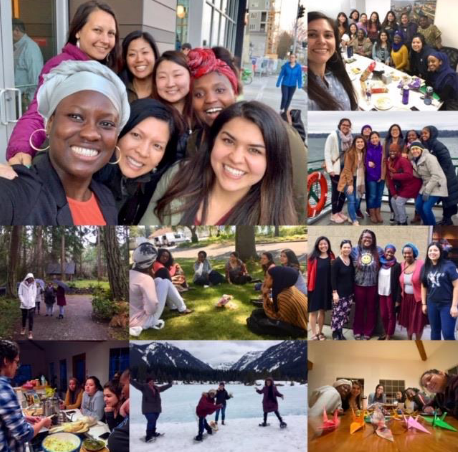As the world adapts to the circumstances surrounding the COVID-19 pandemic, countless conferences, seminars, and other gatherings have gone completely virtual. One such event, the UW Teaching & Learning Symposium, was held online on April 6, 2020. This symposium, in its 16th year of existence, brings faculty, staff, and students from all three UW campuses to share their experiences around teaching, learning, and research. Featuring a keynote on Equity in Learning and speakers from several disciplines across the University of Washington, the symposium fostered conversation and community building, with viewers able to submit questions for the presenters. Watch the presentation VIDEO.
During the symposium’s poster presentation session, four students from the Department of Global Health (Mame Mareme Diakhate, Hannah Atlas, Polly Woodbury, and Diem Nguyen) digitally presented their poster entitled, “Women of Color in Global Health: Equity, Community, Leadership, and Resiliency”. This poster presented the investments, creations, and achievements of Diakhate, Atlas, Woodbury, Nguyen, and the other members of the Women of Color in Global Health Critical Learning Community (WoC CLC), something they say was, “vital for their survival at a predominantly white institution.” By volunteering their time, coordinating meetings, and making space for students of color, this group of women were able to, in their own words, “create a long-lasting network of critical thinking colleagues, gain professional skills and confidence, and increase academic support among group members”.
Each member of the group drew from their experiences and interactions to present information on the background of the WoC CLC, its foundation, and how it has affected the lives of others since its creation. The students also used their virtual poster to outline major takeaways for students of color to remember. This included reminders that students of color not only belong, but also that their experiences and challenges are real, and that for students of color in predominantly white spaces, their presence is an act of social justice. When addressing action points for faculty members, the WoC CLC highlighted the importance of listening with the purpose of learning. They also pointed out the effectiveness of faculty members exploring and encouraging multiple perspectives while maintaining a willingness to adapt.
While sharing their work during the symposium, Woodbury mentioned that, “students of color are less likely to obtain degrees from universities compared to their white counterparts.” This disparity becomes further pronounced at the grad school level, where graduate students of color in the Department of Global Health reported experiences of "invisibility, alienation, and impostor syndrome.” To combat some of these challenges, members of the WoC CLC engaged in collaborative learning dialogues with each other and women faculty members of color in the department.
In addition to the sense of belonging that came with this group, the students also organized and participated in a writing and mindfulness retreat. This was part of the group’s stated effort to make students feel empowered to combat internal self-doubt and establish a community of trust beyond the classroom. They also assisted in organizing and facilitating a welcoming luncheon/networking event for incoming DGH students of color to create a physical space where they could feel included and involved.

As a group, the Women of Color in Global Health Critical Learning Community grounded their work in a community of practice with a social justice framework. By integrating a critical lens to examine the impacts of structural bias, racism, and the impactful legacies of colonialism, the group participated in conversations on diversity, intersectionality, and strategies for navigating both higher education and their futures in the workforce.
“Being a part of the Women of Color in Global Health group has allowed me to make personal connections and to truly feel a part of a community at UW,” said a member of the WoC CLC. “My fellow women of color have given me the strength and power to engage more fully in my education, the tools to think more critically, and the courage to speak my truth.”
Prior to the formation of this community, students reported feeling disconnected or pressured to assimilate, with some also witnessing stereotyping, microaggressions, or racism in the classroom. While no single act alone can eradicate those things for good, the work of Diakhate, Atlas, Woodbury, Nguyen, and other members of the WoC CLC is important for helping students of color to feel a sense of connection and belonging at the University of Washington and in the field of Global Health.
